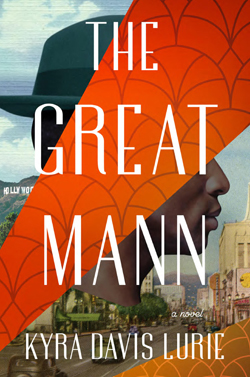 The white paper looks nice against the white linen tablecloth. Like it belong here, in this restaurant, in this hotel, in this city. The woman at the next table is laughing at something her companion said, it’s the laugh of someone who just heard about the failings of an enemy.
The white paper looks nice against the white linen tablecloth. Like it belong here, in this restaurant, in this hotel, in this city. The woman at the next table is laughing at something her companion said, it’s the laugh of someone who just heard about the failings of an enemy.
The laughter of triumph.
The woman who’s laughing has emeralds in her ears. One of the men at the table on the other side of me is wearing a gold watch. The lady who just walked in, the high yellow gal with the broad shoulders, the one asking the host for a table, she’s wrapped up in a mink.
It’s 65º outside and she’s got her mink on.
Everybody in this restaurant, all of them colored folk like me, they’re all just here to enjoy life.
Which is a marvel, ‘cause no colored person was ever brought to America for the purpose of enjoying life. Yet here we are, sitting under chandeliers and eating off porcelain and white linen table clothes.
Triumph.
So much abundance here at the Dunbar Hotel. And in the neighborhood where I’m staying, L.A.’s very own Sugar Hill, that’s dripping with excess too.
Yet here I am, staring at a blank piece of paper, grappling with a paucity of words.
How I gonna write a letter to a woman who can’t read more than two dozen words?
It’d be easier if I could call her, but nobody got money for a phone where she’s from. Where I’m from. At least not any of the colored folk.
What’s a monosyllabic way of saying that far away from the Virginia tobacco fields, there’s a place where colored folk almost live free.
Almost.
‘cause when I sneak a look at that laughing woman, I can see the lines of determination creasing her forehead. And the man with the gold watch just used his napkin to dab at the sweat that’s bubbling along his hairline, like the path to get her took some exertion.
For us colored folk, freedom is an action verb.
Like fighting.
Freedom is being so quick on your feet your enemies can’t land a blow. And there’s always enemies. Even in Sugar Hill where Hattie McDaniel hosts Clark Gable, Lena Horne, Bing Crosby along with humble newcomers like me, even there I see Jim Crow lurking. He working undercover, but he’s working alright.
Funny how some colored folk here can’t see that. When they’re told they can’t live on this street or stay in that hotel they act like it’s some kinda misunderstanding, like they can reason with judges and make them see sense. Some of them seem to think that if they wrap themselves up in furs the white folk will treat them better than the Negros wrapped in cotton.
Crazy how some of people ‘round here roll their eyes at the racists that threaten them. And they’re always threatening them.
Yet they roll their eyes.
But that kind of crazy feels good.
I pull a $10 bill out of my wallet. I cashed my first paycheck an hour ago. A paycheck from an office job. A corporate job. Sliding the bill into the envelope I imagine the look on her face when she sees it. It’s more money than she’s had in her pocket for a while!
But nowhere near enough to pay down her sharecropping debt.
Still, maybe, someday, I’ll make enough to earn her some freedom.
Using large, neat letters I write,
Mama,
All is good here.
I love you,
Charlie
 The Great Mann
The Great Mann
Genre: Historical Mystery
Release: June 2025
Format: Print, Digital
Purchase Link
In this poignant retelling of The Great Gatsby, set amongst L.A.’s Black elite, a young veteran finds his way post-war, pulled into a new world of tantalizing possibilities—and explosive tensions.
In 1945, Charlie Trammell steps off a cross-country train into the vibrant tapestry of Los Angeles. Lured by his cousin Marguerite’s invitation to the esteemed West Adams Heights, Charlie is immediately captivated by the Black opulence of L.A.’s newly rechristened “Sugar Hill.”
Settling in at a local actress’s energetic boarding house, Charlie discovers a different way of life—one brimming with opportunity—from a promising career at a Black-owned insurance firm, the absence of Jim Crow, to the potential of an unforgettable romance. But nothing dazzles quite like James “Reaper” Mann.
Reaper’s extravagant parties, attended by luminaries like Lena Horne and Hattie McDaniel, draw Charlie in, bringing the milieu of wealth and excess within his reach. But as Charlie’s unusual bond with Reaper deepens, so does the tension in the neighborhood as white neighbors, frustrated by their own dwindling fortunes, ignite a landmark court case that threatens the community’s well-being with promises of retribution.
Told from the unique perspective of a young man who has just returned from a grueling, segregated war, The Great Mann weaves a compelling narrative of wealth and class, illuminating the complexities of Black identity and education in post-war America.
About the author
Kyra Davis Lurie is a New York Times bestselling author and screenwriter. Her books have been published in nine languages across 6 continents. She lives in Los Angeles with her husband where they both serve as advisors to their dog, Potus.

This book looks great. The writing is wonderful. Looking forward to reading it.
Fantastic! I cannot wait to read The Great Mann.